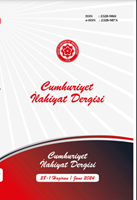Mûsâ İznikī’nin Tercüme Ettiği Tefsirler ve Sürûrî’ye İsnat Edilen Tefsirin Gerçekliği
Translations of Tafsirs by Mūsā Iznikī and the Authenticity of the Tafsir Attributed to Surūrī
Author(s): Murat KayaSubject(s): History of Islam, Sociology of Religion, History of Religion, Qur’anic studies
Published by: Cumhuriyet Üniversitesi İlahyat Fakültesi
Keywords: Tafsir; Abū al-Lays Samarqandī; Najm al-Dīn Dāya; Khāzin al-Baghdādī; Mūsā Iznikī; Surūrī; Tafsīr al-Lubāb; Anfas al-Jawāhir;
Summary/Abstract: It is seen that serious mistakes were made in determining the names, authors, and translators of many scientific works written in the past and mostly remained in manuscript form in our libraries. This situation does not allow us properly to benefit from our important scholarly collections by preventing some significant works from being explored. In this context, some research and library records indicate that the 15th-century Ottoman scholar Mūsā Iznikī (d. 838/1434-35 [?]) translated Ali b. Muhammad al-Khāzin’s (d. 741/1341) work called as “Lubāb al-ta’wīl fī meʻān al-Tanzīl”. Similarly, it is claimed that the 16th-century Ottoman scholar and court poet Muslihuddin Mustafa Surūrī (d. 969/1562) wrote a complete Turkish tafsir. These two claims share a common point as they eventually converge on the same translator. This article aims to investigate the originals and translations of these two works to determine their actual authors and titles. The urgent need for such research for thousands of works in our libraries is apparent, as some researchers have based their master’s and doctoral theses and various articles on incorrect information. This article aims to contribute to the academic world by presenting new findings on the two works, which are clouded by incorrect information and uncertainties, and to draw attention to the need for further research in this field. This research, which utilized document scanning, data collection, and data analysis techniques, has led to the following conclusions: The work that Mūsā al-Iznikī translated and named “Tafsīr al-Lubāb” is actually an abridged version of “Baḥr al-ḥaḳā’ik wa al-meʻānī”, a tafsir by Najm al-Dīn Dāya (d. 654/1256), not Khāzin’s “Lubāb al-ta’wīl”. It has also been determined that the work known today as “Ta’wilat al-Najmiyya” is not the original tafsir written by Dāye. Dāye wrote a detailed tafsir combining exoteric and esoteric interpretations, and his disciple Shams al-Din Muhammad al-Sawji abridged this work by removing the exoteric interpretations, leaving only the esoteric. Iznikī translated this abridged version and named it “Tafsīr al-Lubāb”. The tafsir attributed to Surūrī has been found not to have been authored by him. Comparisons have revealed that this work is a tafsir translation of Abū al-Lays Samarqandī’s (d. 373/983) work named as “Tafsir al-Qur’an al-Karīm” or “Tafsir Abū al-Layth al-Samarqandī”, known today as “Bahr al-Ulum”. This translation is attributed in some sources and library records simultaneously to Ahmad Dāī (d. after 824/1421), Ibn ʻArabshah (d. 854/1450), and Iznikī. When comparing copies attributed to different people, it is apparent that they are all the same work. Examination of certain ancient copies and manuscript records indicates that this translation was also done by Iznikī, who named this second translation “Anfas al-Jawāhir”. There has been confusion in the academic world regarding this name, with some researchers mistakenly believing it was the name given to Khāzin’s translation. However, early manuscripts clearly show that this name was given to the translation of Samarqandī’s tafsir. Abridged copies of “Anfas al-Jawāhir” have been found in our libraries, but it has not been possible to determine who performed this abridgment.
Journal: Cumhuriyet İlahiyat Dergisi
- Issue Year: 28/2024
- Issue No: 1
- Page Range: 449-466
- Page Count: 18
- Language: Turkish

